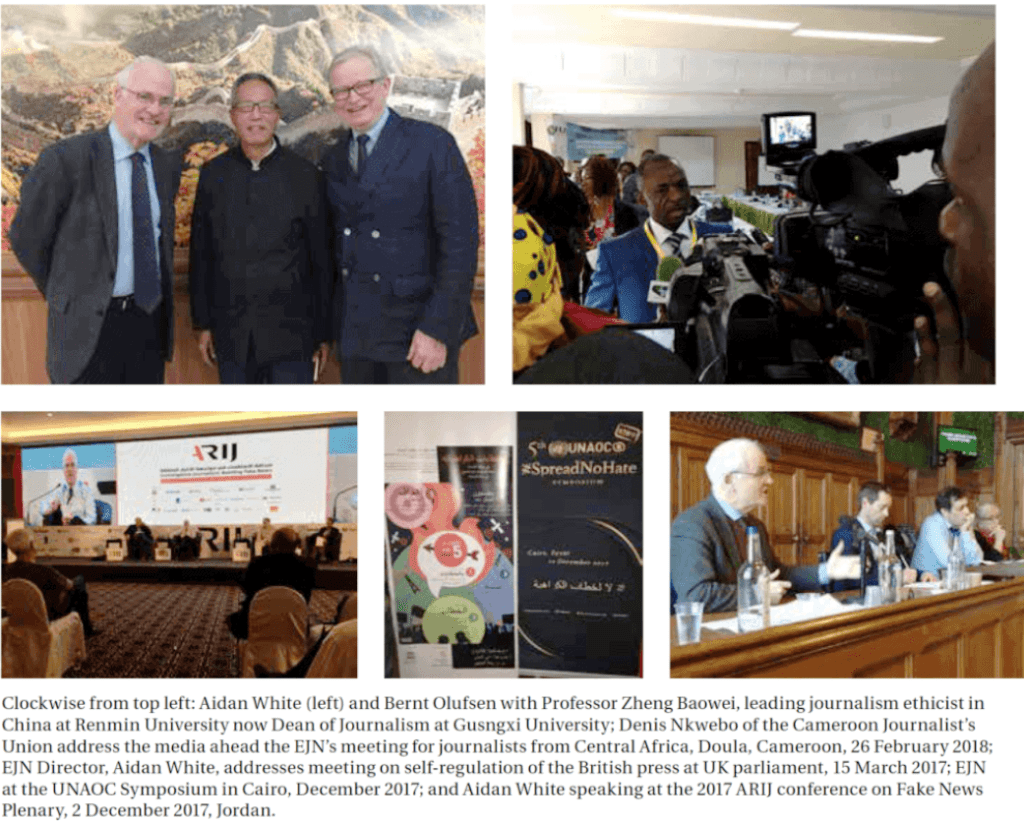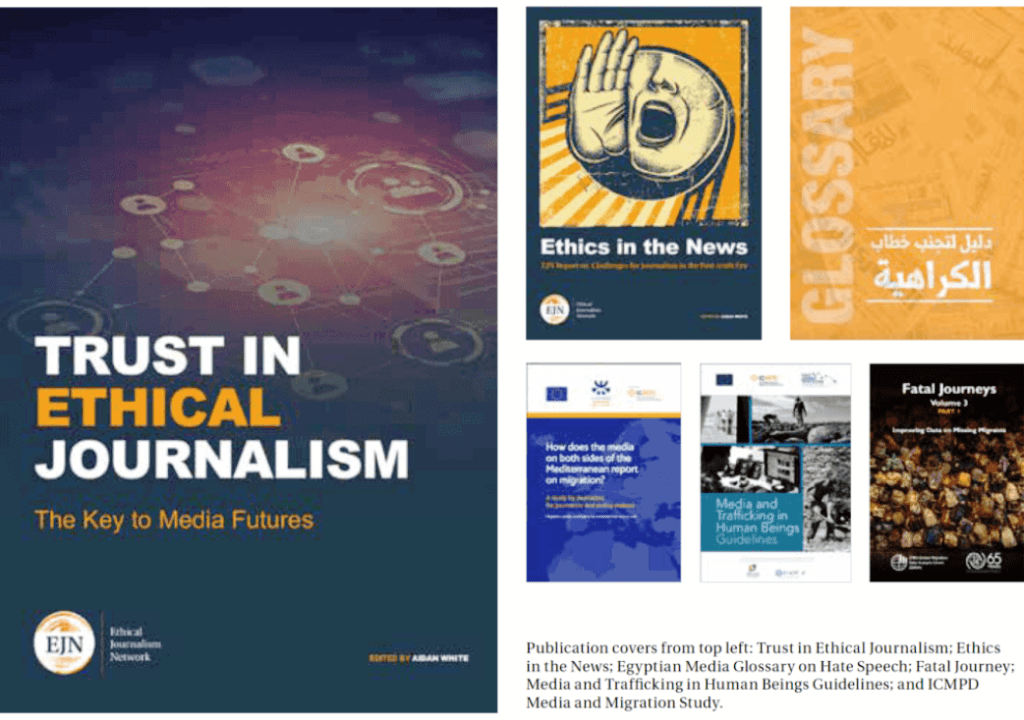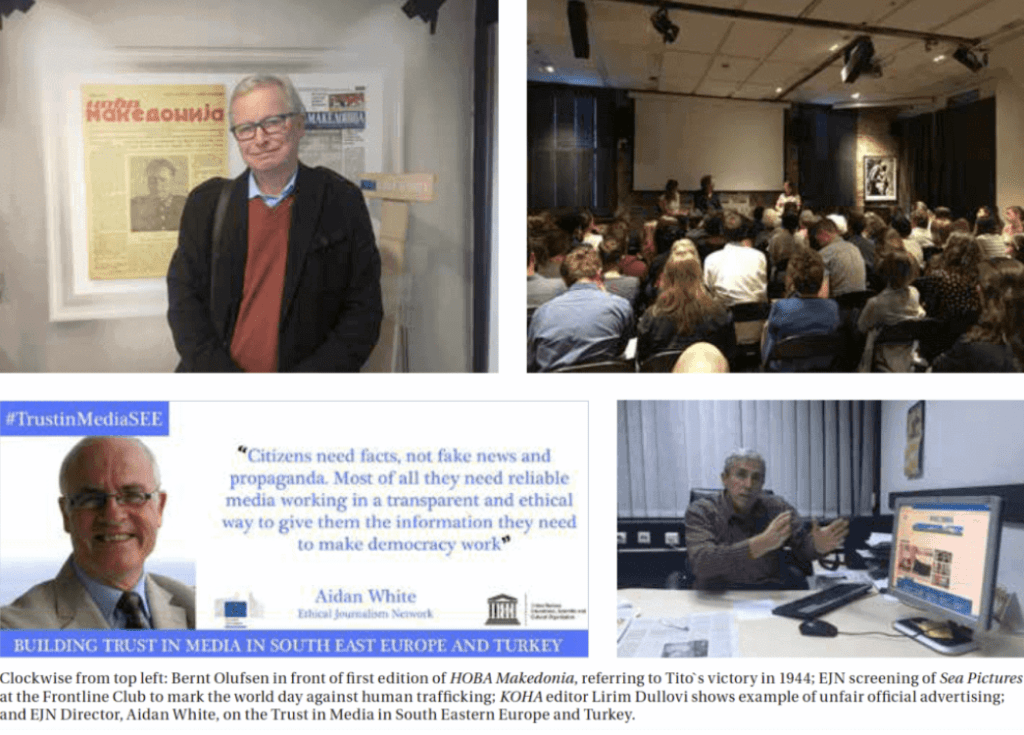Ethical Journalism: The Key to Building Trust in the News
Summary
This report on the work of the Ethical Journalism Network in 2017 and the first months of 2018 covers a period in which the buzzwords “fake news” and “post-truth” provided a misleading but appropriate focus for the news industry.
In recent months the challenges of a flawed information landscape have been dramatically exposed with Google, Facebook and other internet giants being called to account for their failure to promptly deal with the pollution of the information landscape.
The global debate about the integrity of information in the public sphere provides a golden opportunity to strengthen journalism and to promote ethical communications and the focus of the EJN has been about getting back to basics and building trust in reliable, accurate and stylish story-telling.
The year began with intense debate about the rise of malicious news-making by unscrupulous centres of power – the so-called “fake news” crisis – and it ended with a sense that although this crisis will pass, much more must be done to strengthen the craft of journalism to meet the demands of a rapidly-changing world of communications.
The major EJN achievements during the past year include:
- The development of a comprehensive programme for building networks for change in Africa through training in data journalism, good governance, respect for authors’ rights, and by creating networks for ethical journalism to combat corruption, and violent extremism (See Appendix Three, Four, Five);
- The creation of a united front among media, journalists’ groups and media support groups in Turkey and the preparation of a detailed action plan to strengthen journalism, even in the midst of hostile conditions (See Appendix One);
- The launch of practical tools to combat hate speech, including a glossary of hate speech for journalists in Egypt and a ground-breaking initiative bringing together journalists from the north and the south of Cyprus to work together in the production of a glossary to identify and eradicate hate speech on both sides of the divided island;
- The carrying out of a mission to China which opens the door to new co-operation with Chinese media and with journalism schools;
- The launch of The Ethical Journalist’s Toolkit, a free online training programme for journalists and people supporting ethical communications developed in partnership with the Thomson Foundation in London;
- The publication of two issues of Ethics in the News, reports on the ethical challenges in covering the major stories of 2017 and 2018 which outlines ways in which journalists can respond to the threat of disinformation and confront the global trust crisis which is overwhelming the public information sphere;
- The preparation and distribution of detailed guidelines for journalists and media around the world reporting on migration and human trafficking;
- The launch of new programmes with UNESCO and Council of Europe to support independent media in the Western Balkans targeting self-regulation and good governance in Albania, Montenegro, and Macedonia;
- New streams of work with the other United Nations agencies including initiatives on media reporting of migration, helping media track migrant deaths and the launch of a mentoring project for reporters covering labour migration in the Middle East and Gulf states with the International Labour Organization
- We also consolidated work in three major EJN actions areas:
- The world’s first searchable database of media codes, press councils and standards Accountable Journalism (accountablejournalism.org) has been reinforced with Middle East and Asian support programmes;
- The EJN’s campaign against hate speech – Turning the Page of Hate – was endorsed by African journalists at meetings in Abuja, Douala and Nairobi, as well as by Arab media leaders at meetings in Jordan and Cairo, which strengthened the Arab Media Hub Against Hate Speech. (See Appendix Two.)
- The EJN’s Ethical Media Audits, a tool to improve transparency and governance in the ownership and administration of media, has been adopted by one of the world’s leading media development groups, International Media Support, for use in its 25 country programmes in some of the world’s most troubled and challenging regions.

The EJN has continued to grow. We have increased our activities, strengthened our links with supporters and at the same time improved our internal organisation and financial standing.
We have raised our profile in the education and training of a new generation of journalists eager to immerse themselves in the technology and systems of a changing industry but committed to the values that make journalism as important to democracy as it ever has been.
During 2017 our regional programmes have reinforced and strengthened our ground-breaking action of the past four years. Across the globe our campaign to eradicate hate speech from journalism has been strengthened by the widespread dissemination of our 5-point test for hate speech, which is now translated into 30 languages.
Today media departments and students of journalists around the world routinely turn to the themes and ideas from the EJN about the core values of journalism, whether it is to help them report the crisis of migration; or in dealing with racism and intolerance; and in their reporting of conflict and humanitarian crisis.
We have also carried out targeted actions to support ethical journalism in high-risk areas such as Turkey, Egypt, Syria and Kenya and we have developed programmes to improve good governance and self-regulation for media in areas as diverse as Pakistan, Kosovo, Jordan and China and we are working with universities and civil society groups to strengthen respect for journalism as a public good.
The EJN continues to be influential far beyond its core group. As the only world network of media professionals dedicated to ethics, governance and media self-regulation the growing enthusiasm for our work provides solid evidence that ethics and professionalism are the keys to creating reliable streams of journalism that people can trust, and they are needed more than ever.
Aidan White, President
Activity Report
Throughout the year, the EJN has continued to put ethical standards in journalism at the heart of discussions about media literacy and free expression.
The debate about trust in journalism and in global communications has intensified with problems of disinformation and concerns over the exploitation of private information by social networks and technology companies.
We argue that society needs to develop new ways of responding to the new context of digital information as well as the increasing influence of the state, corporations and new Internet publishers on free expression and on journalism.
On a global level, the EJN has worked closely with the agencies of the United Nations and has taken part in United Nations activities to influence policy on issues ranging from media and hate speech to the ethical framework for responsible public communications.
The situation in Turkey continues to concern the EJN. Following our special report on the crisis in the country in 2014 and the devastating events during 2016 in which media and independent journalists were targeted in a state of emergency following a coup attempt, the EJN set out a detailed analysis in the EJN report Ethics in the News. Our response to the crisis is ongoing.
During the year we have also strengthened our links with the media development community and working with International Media Support we have helped them develop an ethics strategy for media management for their partners working in 25 countries facing some of the most difficult economic, social and political challenges. We have also been in discussion with other media support groups, including Free Press Unlimited and the Open Society Institute about further sharing of the innovative work we have developed to strengthen transparency and good governance inside media.
Our regional focus on the media in countries of Africa, Asia and the Middle East has remained a top priority during the year.
Asia Programme: the EJN worked with local media and academic partners to strengthen efforts to improve standards of reporting in the face of intolerance and increasing propaganda amidst the growing political tensions in the region. Ethics, we have argued, are an antidote to media propaganda and war-mongering and we have been strongly supported by universities and leading journalists in the region.
The EJN has strengthened ethical journalism in Pakistan working with the Coalition for Ethical Journalism established in partnership with local media leaders in 2012. We have helped prepare detailed reports on a unified code of conduct for Pakistan journalism and a detailed report with recommendations on strengthening media capacity to combat external and internal pressures on journalism.
The EJN has established a working relationship with the All-China Journalists Association in China, and in April 2018 we carried out a new mission to the country where we reinforced our contacts with journalists and journalism schools. The results of our mission, which include detailed proposals for education, training and cooperation on ethical issues for media, confirm the need for new dialogues to strengthen ethical journalism without allowing self-regulation to become a form of control of independent journalism. The media and journalism landscape are vast and complex, but Chinese journalists are open to new forms of cooperation that will address the challenges facing media the world over.
Africa Programme: during 2017 and the beginning of 2018 the EJN carried out actions that have paved the way for an extended programme for the next three years working with the Federation of African Journalists, and a range of local partners. We carried out work with the continent’s leading journalists’ groups in Nigeria and also held a targeted session in Cameroon ahead the elections in the autumn of 2018 and brought together media leaders in Nairobi in the aftermath of the controversial second round of the Kenyan Presidential elections to discuss how to address media bias, hate speech and propaganda as well as over the issues facing East African journalism.
The results of those meetings are attached to this report (See Appendix Three, Four and Five). All three meetings acknowledged a deepening crisis for journalism in Africa and made strong calls on media owners and managers to engage in dialogue to up their game with better governance and more transparency in order to improve the financial prospects of the profession and the news industry. In particular, the meetings called for media owners to open themselves up to a thorough review of how they work and to set higher standards in the management and operations of media companies.
It was agreed to circulate the EJN Ethical Media Audit, which helps managers and owners to bring the owners and executive branch of media into line with the ethical standards expected of journalists and editors in the newsroom.
An important initiative launched in Africa during 2017 and 2018 is an EJN programme in partnership with Norwegian media professional groups representing journalists and media employers and supported by Kopinor, the copyright agency in Norway. This programme – The Ethics of Authors Rights in the Digital Age – is an innovative online teaching tool which will raise awareness in the African media community on ways of tackling the pressure on authors’ rights from technological change.
Middle East Programme: A key part of our work is confronting hate speech and in December the EJN held the second regional meeting of Arab media leaders to finalise a programme of practical work for the Arab Media Hub Against Hate Speech. The EJN also took part in activities in Doha in cooperation with Aljazeera, including participating in two major international conferences on journalism and human rights, as well as conducting training on hate speech, migration, human rights and humanitarian reporting for senior Aljazeera journalists.
With Aljazeera, the EJN joined the International Press Institute and the African Media Imitative for a symposium on human rights and journalism in Khartoum for journalists and civil society. The opportunity also allowed the EJN to enter dialogue with the Sudanese government on its poor press freedom record and call for Sudanese media to be given the freedom to organize itself without state interference.

During 2017 the EJN continued to be at the forefront of debates to follow up our migration and media report Moving Stories. We contributed to the International Organisation of Migration book Fatal Journeys, which aims to track down the identity of the thousands of victims of the migration crisis. We also carried out a programme to produce media guidelines for reporting Trafficking in Human Beings and a 17-country study for journalists and policymakers How does media on both side of the Mediterranean Cover Migration, both in cooperation with the International Centre for Migration Policy Development. In April 2018 the EJN published a new edition of Ethics in the News entitled Ethical Journalism: The Key to Media Futures, which looks at how the communications revolution is continuing to pose more questions than answers over a public crisis of confidence, both in democracy and in sources of public information.

Western Balkans and Turkey Programmes: The 2017 Building Trust in Media and South East Europe and Turkey UNESCO programme continued with EJN actions in Montenegro and Macedonia. The EJN dimension of the programme is directed at owners, managers and editors of media across all platforms of journalism and following the experience in Serbia and Kosovo during 2016, changes were made to the approach to take account of the difficult political and economic conditions in which media work.
During this first phase of the work in 2017 the EJN has:
- Prepared materials to perform internal audits of media outlets in Macedonia and Montenegro to help them apply ethical standards, to manage conflicts of interests and to improve standards of good governance. These audits help develop structures for internal monitoring and regulation of performance;
- Carried out three missions to the region in August 2017 and October 2017 and November 2017;
During these missions, the EJN started the process of selecting media houses in each target country of the project to support further actions to promote internal good governance using the principles of ethical audits.
The following agreed to further work in this area:
In Montenegro the EJN joined a new European Union project in co-operation with the Montenegro Media Institute and the Peace Institute to support ethics and good governance in local media, which launched in February 2018;
In Macedonia the EJN is supporting efforts to create a new Association of Print Media and a separate Association of Editors. At present the journalism Code of Ethics applies only to journalists, not editors nor owners;
In Cyprus the EJN has been assisting a groundbreaking initiative to develop a glossary of hate speech. In an unprecedented initiative supported by the Organisation for Security and Co-operation in Europe journalists and media leaders on both sides of the divided island are working together to define the harsh words and troublesome phrases that are an obstacle to understanding and peaceful dialogue;
In Turkey the EJN has initiated a solidarity process in which key organisations representing journalists and media support groups have come together to challenge the oppressive policies of the government which has targeted dissidents and media critics since the attempted coup in 2016. In 2018 the EJN organised meetings with Turkish colleagues, regulators, investigative journalism groups, and media educators in Istanbul and Ankara including the Turkish Syndicate of Journalists, the Turkish Press Council and a number of media support groups.
Although the media crisis in Turkey is profound with more than 140 journalists in jail or facing prosecution, Turkish journalists and media supporters are defiant and plan to work together to strengthen the skills, awareness and capacity of news staff. During 2018 the EJN will be working with international supporters, including the International Press Institute, to encourage further actions towards building solidarity and practical actions to support journalists and media.